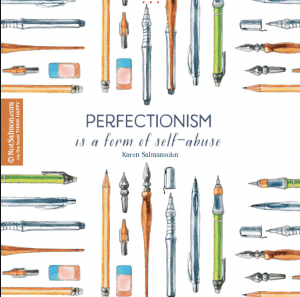
You might think trying to be perfect will ensure you produce extraordinary work. But perfectionism can sabotage your career – instead of help you. Here’s why – and how to make sure you’re not harming your career with the need to be perfect.
Social media is driving a worrying trend. It’s allowing people to broadcast their lives in a way which makes them appear far more glamorous and exciting than they actually are. You know people from your work, college or childhood who are regularly traveling all over the world, meeting interesting people, and looking great in highly edited and filtered pictures. From your laptop computer screen, it seems as if they are living the perfect life.
The truth (in almost all certainty): Their lives are not perfect.
Just like you, they have their share of problems, whether it’s a mountain of debt, issues in their romantic relationships, or a secret love child they don’t want you to know about.
 But we don’t see those problems. And if we don’t have a healthy perspective on the state of our own lives, it can lead us to feel bad about ourselves and the need to do better
But we don’t see those problems. And if we don’t have a healthy perspective on the state of our own lives, it can lead us to feel bad about ourselves and the need to do better
It’s a truism to say that nobody is perfect.
But all too often we trick ourselves into believing that we can be – so long as we work hard enough, find the right job, or get into a relationship with the ideal person – our “soul mate.”
The problem with perfectionism is that it’s a moving standard.
Being perfect in a world full of randomness, evil and betrayal is not realistic. But when we require perfectionism of ourselves, we set up an impossible standard: something that we cannot ever hope to achieve.
Perfectionism is a form of self-sabotage. Not in the usual way – but to our capacity to ever achieve satisfaction.
Nothing is ever good enough because, by construction, nothing can be perfect.
The Dangers Of Perfectionism
Perfectionism isn’t just destructive to happiness. It’s also something that chips away at the foundation of your life in ways you wouldn’t ordinarily expect.
Take social acceptance, for instance.
The need to be perceived as perfect isn’t just a source of stress. It’s also something that gets in the way of building authentic connections with other people. It’s not possible for you to have a healthy relationship with somebody if you’re not willing to talk about your issues and difficulties. You can’t be open with them, so you remain permanently invisible.
 Perfectionism also isn’t sustainable.
Perfectionism also isn’t sustainable.
It’s exhausting having to give off an air of invincibility all the time when the reality is different. You feel like you have to behave in a certain way or dress to impress. But over time, keeping up pretenses is exhausting. And you eventually run out of energy.
Then there’s the effect perfectionism has on your career.
People who are detail oriented tend to do well in the modern economy. But there’s a limit to how much time you can invest in detail without seeing the larger picture. When you sweat the small stuff (such as the grammatical accuracy of your emails), then you risk burnout. And when you’re burned out, you can’t direct your energies to your career objectives.
Perfectionism is self-defeating.
Some people who believe in the need for perfectionism also struggle to think that they’re in a position to progress in their career. Workers may wait forever for the stars to align – the point at which they feel they are in a place to move forward, such as when they have a certain amount of training or experience under their belt. The future belongs to the brave, not the perfect.
Believing That Others Are Perfect
 Perfectionism isn’t just something that people direct inward, but also outward too onto the people around them. Lovers may expect their partner to be perfect. If they’re not, it’s a severe source of consternation. Likewise, workers might believe that they have to have the ideal job or a dream career. When the reality is at odds with their expectations, they feel robbed, and as if they can never have happiness.
Perfectionism isn’t just something that people direct inward, but also outward too onto the people around them. Lovers may expect their partner to be perfect. If they’re not, it’s a severe source of consternation. Likewise, workers might believe that they have to have the ideal job or a dream career. When the reality is at odds with their expectations, they feel robbed, and as if they can never have happiness.
Perfectionism, therefore, is an insidious force. It seems like a good thing to strive for excellence within yourself and your relationships with others, but it’s a kind of magical thinking that permanently separates you from the things that you want. You might never have your idea of a perfect life: “true love,” the “perfect career” or have millions of dollars in the bank. You may never find a person who can achieve your standards of perfection because that person, in all likelihood, doesn’t exist.
The mark of a psychologically mature person is somebody who accepts the basic fact that practically everybody is flawed in some way. Yes, there are one-in-a-million freaks who do have it all sorted, but they’re a wild exception, not the norm. The majority of people are plodding through, struggling with the weight of their history.
Setting Inhumane Goals
Perfectionists can be cruel to themselves. They may work long hours without a break or holiday to achieve their financial goals. They may lie awake at night, worrying about how they’re going to climb the greasy corporate ladder or whether their new lover is worthy of a long-term partnership. Perfectionism makes everything in life seem inadequate, preventing you from living in the moment and taking full advantage of the fleeting episodes of joy that life occasionally delivers.
Perfectionism can override these events, causing you to obsess over the smallest details rather than taking what you can from a situation while accepting that it might not be ideal in every way that you can imagine.
 How To Make Sure Perfectionism Doesn’t Sabotage Your Career
How To Make Sure Perfectionism Doesn’t Sabotage Your Career
Left unchecked, perfectionism can ruin your career and life. How, then, can you beat it?
1. See Yourself As Worthy
Perfectionism often stems from a lack of self- acceptance or other-acceptance. It’s the idea that either you or the people around you aren’t good enough unless they fulfil some predefined criteria. More often than not, this stems from a lack of self-acceptance: being okay with the way that you are. It’s crucial, therefore, to recognise what’s driving your perfectionism. It’s not about the failings of others, but the way that you feel about your authentic self: something that you want to hide.
2. Remind Yourself That You Don’t Need The Best Of Everything
Given our ultra-competitive consumer culture, it’s not surprising that we feel as if we have to have the best of everything. We’re not just talking about material possessions either: increasingly, the ideal life involves having both excellent relationships and health too. It’s a lot of pressure.
If you’re a perfectionist, your relationships will always suck because you’ll never reach that point of psychological maturity where you can accept and share weaknesses in yourself with others. Perfectionism means that you’re always chasing a mirage that can never materialise.
 3. Be Less Critical Of Others
3. Be Less Critical Of Others
Being critical of others is a great way to convince yourself that other people aren’t good enough. It stops you from having close relationships with them and can hurt you at work where getting along with people is an integral part of progressing your career.
Being less critical isn’t saying that you’re abandoning your moral or ethical standards. It just means that it’s okay if somebody is brash, rude, ignorant, arrogant, or puerile. What’s not okay are people who are violent or fraudulent. Most people, however, act out because they’ve misunderstood something or there’s been a break down in communication. The vast majority of people are not plotting to do evil.
4. Surround Yourself With People Who Don’t Care About Money, Sex And Power
If possible, try to surround yourself with people who accept life the way that it is and who aren’t obsessed with money, sex and power. Status is toxic to your mental health and future ambition.
Don’t Let Perfectionism Harm Your Happiness
I write more about the dangers of perfectionism in my bestselling book, Think Happy.
Think happier. Think calmer.
Think about subscribing for free weekly tools here.
No SPAM, ever! Read the Privacy Policy for more information.
One last step!
Please go to your inbox and click the confirmation link we just emailed you so you can start to get your free weekly NotSalmon Happiness Tools! Plus, you’ll immediately receive a chunklette of Karen’s bestselling Bounce Back Book!



 But we don’t see those problems. And if we don’t have a healthy perspective on the state of our own lives, it can lead us to feel bad about ourselves and the need to do better
But we don’t see those problems. And if we don’t have a healthy perspective on the state of our own lives, it can lead us to feel bad about ourselves and the need to do better  Perfectionism also isn’t sustainable.
Perfectionism also isn’t sustainable.  Perfectionism isn’t just something that people direct inward, but also outward too onto the people around them. Lovers may expect their partner to be perfect. If they’re not, it’s a severe source of consternation. Likewise, workers might believe that they have to have the ideal job or a dream career. When the reality is at odds with their expectations, they feel robbed, and as if they can never have happiness.
Perfectionism isn’t just something that people direct inward, but also outward too onto the people around them. Lovers may expect their partner to be perfect. If they’re not, it’s a severe source of consternation. Likewise, workers might believe that they have to have the ideal job or a dream career. When the reality is at odds with their expectations, they feel robbed, and as if they can never have happiness.  How To Make Sure Perfectionism Doesn’t Sabotage Your Career
How To Make Sure Perfectionism Doesn’t Sabotage Your Career 3. Be Less Critical Of Others
3. Be Less Critical Of Others